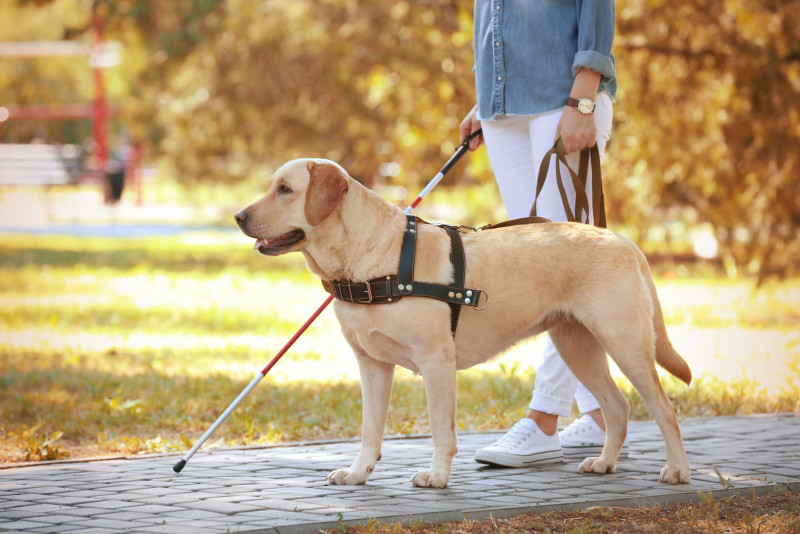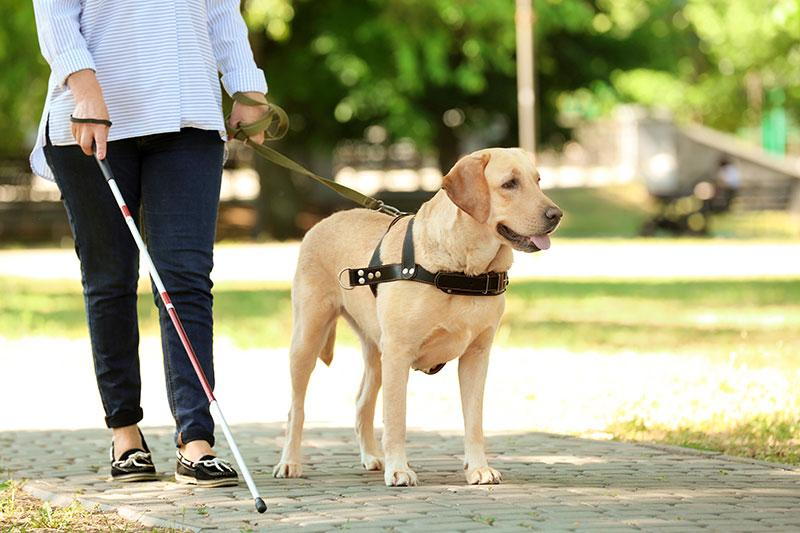September is National Service Dog Month, a time dedicated to honoring the invaluable contributions of service dogs that assist people with various disabilities, including visual impairments. These specially trained animals are more than just companions; they serve as essential guides, providing independence, mobility, and safety for individuals who are blind or visually impaired. Service dogs are rigorously trained to perform specific tasks that help their handlers navigate daily life with greater confidence, ensuring they can perform essential activities with a level of independence that would otherwise be difficult or impossible. Let’s celebrate the Vital Role of Service Dogs for the Visually Impaired.
The Role of Service Dogs for the Visually Impaired
For visually impaired individuals, service dogs are indispensable partners. These dogs undergo extensive training to guide their handlers around obstacles, stop at curbs and stairs, and help them safely cross streets. They are trained to respond to commands but also possess the intelligence to disobey if following an order would put their handler in danger—a quality known as “intelligent disobedience.” This unique ability allows service dogs to make judgment calls that prioritize their handler’s safety over direct instructions, highlighting the depth of their training and the importance of their role.
Beyond guiding, service dogs also provide emotional support, helping their handlers navigate social situations with increased confidence. These dogs are often seen as extensions of their handlers, forming deep bonds built on trust and companionship. The presence of a service dog can alleviate feelings of isolation that often accompany visual impairments, making their impact on mental health as significant as their physical assistance.
The Training and Selection of Service Dogs
The journey of a service dog begins long before it meets its handler. Service dogs are typically bred for temperament and health, ensuring they possess the qualities necessary for a demanding role. From a young age, puppies are exposed to various environments, sounds, and situations to build their confidence and adaptability. As they grow, they undergo rigorous training that can last up to two years, learning skills such as navigation, obstacle avoidance, and responding to various commands.
Only dogs that meet strict behavioral and physical standards are selected to continue training as service dogs. Trainers focus on developing the dog’s ability to stay focused, calm, and responsive in any environment, ensuring that they can perform reliably in both busy city streets and quieter settings. The result is a highly skilled animal that can adapt to the unique needs of its handler, providing unmatched support in everyday life.
The Impact on Quality of Life
For many visually impaired individuals, the addition of a service dog is life-changing. These dogs enable greater participation in work, school, and social activities, breaking down barriers that might otherwise limit their opportunities. With a service dog by their side, handlers can travel more freely, reduce their reliance on others, and regain a sense of autonomy that significantly enhances their quality of life.
The psychological benefits of having a service dog are also profound. Many handlers report feeling safer, more connected, and less anxious in their day-to-day activities. The presence of a service dog can encourage social interaction, as people often feel more comfortable approaching someone with a dog than approaching a person using a cane. This increased social engagement helps reduce the feelings of loneliness and depression that are common among those with visual impairments.
The Legal Protections for Service Dogs
Service dogs are protected under laws such as the Americans with Disabilities Act (ADA), which grants them access to public spaces, transportation, and housing. These legal protections are crucial, as they ensure that service dogs can accompany their handlers wherever they need to go, whether it’s a grocery store, restaurant, or workplace. The ADA also prevents discrimination against individuals who rely on service dogs, helping to safeguard their rights and dignity.
In addition to federal protections, many states have enacted their own laws to further support the use of service dogs, making it illegal to deny access or charge extra fees for handlers with service dogs. These legal measures are critical in ensuring that service dogs can perform their duties without unnecessary barriers, allowing their handlers to lead more independent and fulfilling lives.

Why Service Dogs Are Essential for the Visually Impaired
The role of service dogs extends far beyond mere assistance; they are lifelines that provide safety, independence, and emotional well-being. For visually impaired individuals, these dogs are not just helpers but partners in every sense of the word. The unique relationship between a service dog and its handler is built on trust and mutual respect, enabling the handler to live with greater freedom and confidence.
Service dogs are also critical in promoting public awareness of visual impairments. Their presence serves as a reminder of the challenges faced by those with disabilities, fostering a more inclusive and understanding society. As National Service Dog Month shines a spotlight on these incredible animals, it also emphasizes the importance of supporting organizations that train and provide service dogs, ensuring that more individuals can benefit from their companionship and assistance.
How You Can Support Service Dog Organizations
Supporting service dog organizations is vital to ensuring that these incredible animals can continue to assist those in need. Many non-profits rely on donations and volunteers to train and place service dogs with visually impaired individuals. Contributions help cover the extensive costs of training, veterinary care, and matching dogs with the right handlers. By supporting these organizations, you can play a role in empowering individuals with visual impairments to lead fuller, more independent lives.
Whether through monetary donations, volunteering your time, or simply spreading awareness, there are many ways to get involved. National Service Dog Month is the perfect time to celebrate these incredible animals and the profound impact they have on the lives of those they serve.
Service Dogs for the Visually Impaired
National Service Dog Month is a celebration of the essential role that service dogs play in the lives of visually impaired individuals. From their rigorous training to their unwavering support, these dogs are true heroes who provide safety, independence, and companionship. As we honor these incredible animals, it’s important to recognize the organizations that make their work possible and to support efforts to provide service dogs to those who need them most.
At Optical Illusions: An Optometric Practice, we prioritize your eye health and provide the best voted eye exams. Our experienced optometrists and opticians use state-of-the-art technology to help those with blindness or visual impairment. Contact our team to schedule your appointment at 1 of our 4 conveniently located offices using your VSP insurance benefits.



